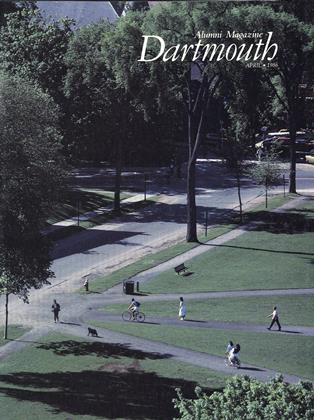Commentary on world and national politics was the focus of talks by most of the winter term's major visitors to campus. Students were treated to insights on domestic and foreign affairs by speakers ranging from former President Gerald Ford to civil rights leader Julian Bond to the Swiss ambassador to the U.S.
Ford visited campus at the invitation of the Class of '86, with assistance from the Montgomery Foundation. In a major address he detailed "two very serious constitutional crises" in the federal government. He blasted the budgetary process in Washington, while questioning the constitutionality of Gramm-Rudman, and criticized Congress's increasing involvement in military and foreign policy. Responding to a question later about divestment, Ford said he feels that an American presence in South Africa is more effective in combating apartheid than divestment.
A different view on divestment was provided by Julian Bond. Bond, president of the Institute for Southern Studies and a Georgia state senator, came to Dartmouth under the sponsorship of the AfroAmerican Society. He said South African investment "doesn't make economic sense, doesn't make moral sense, doesn't make any sense" and called for U.S. aid for the African National Congress. He also had harsh words for current domestic civil rights policies, feeling gains of past decades are in "imminent danger of being wiped out."
The Swiss ambassador to the United States, Klaus Jacobi, spoke on the recent Geneva summit, part of a series on the topic sponsored by the Rockefeller Center and the Dickey Endowment. Jacobi gave a first-hand view of the disarmament talks, saying there are no "quick solutions" to the East-West conflict.
Another European diplomat, West Germany's deputy consul general in Boston, Hartmut Lang, talked about possibilities for reunification of the two Germanys.
A Soviet view of the summit was lent by Valentin Berezhkov, editor of Moscow's most authoritative journal on American affairs. He praised as real though small gains in U.S.-Soviet relaions at the most recent Reagan-Gorbachev talks but said progress in arms control could be jeopardized by the Strategic Defense Initiative.
An attack on "Star Wars" from a domestic point of view came from writer and activist Clark Kissinger. His visit was sponsored by the Tucker Foundation and the New Hampshire chapter of Phsyicians for Social Responsibility.
Campus visitors also addressed topics other than politics. The chairman emeritus of the Pillsbury Company, William Spoor '46, was the first speaker in a series of lectures on leadership, established in his honor at Dartmouth with a grant from Pillsbury. Saying leadership can be learned but not taught, Spoor urged Dartmouth students not to fall into a pattern of youthful activism following by aging apathy.
A noted Korean economist, Seung-Soo Han, spoke about South Korea's rise as an economic power. He called South Korea proof that market economies can industrialize undeveloped nations.
The winter term also brought visits from June Jordan, a poet and educator, who delivered the College's seventh annual Martin Luther King Lecture, and Anne Fausto-Sterling, author of a controversial new book called Myths of Gender, spoke on the Rockefeller Center's "Women in Public Service" series, saying gender differences should not be attributed to biological causes but to social customs.
Former President Ford had lunch with a smallgroup of seniors during his campus visit sponsored by the Class of 'B6.
After his formal speech, civil rights activistJulian Bond led a march to the Green, wherehe spoke in favor of divestment.
 View Full Issue
View Full Issue
More From This Issue
-
 Feature
FeatureThe Peace Corps at 25
April 1986 By Laura T. Hammel -
 Feature
FeatureSTRATS
April 1986 By Willem Lange -
 Feature
FeatureRecent Accessions in European and Graphic Art at The Hood
April 1986 By Hilliard T. Goldfarb -
 Article
Article"Kiki" McCanna: Steward of Sanborn
April 1986 By Lee McDavid -
 Article
ArticleRave Reviews?
April 1986 By Dorothy L. Foley '86 -
 Class Notes
Class Notes1959
April 1986 By Richard A. Masterson







